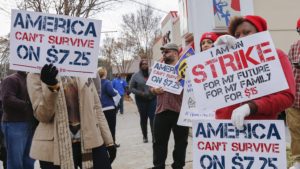 “A U.S.-based economist won the Nobel prize for economics Monday for pioneering research that showed an increase in minimum wage does not lead to less hiring and immigrants do not lower pay for native-born workers, challenging commonly held ideas,” NBC News reported on Monday, October 11, 2021 (read story here).
“A U.S.-based economist won the Nobel prize for economics Monday for pioneering research that showed an increase in minimum wage does not lead to less hiring and immigrants do not lower pay for native-born workers, challenging commonly held ideas,” NBC News reported on Monday, October 11, 2021 (read story here).
While the story doesn’t explicitly say so, those ideas are commonly held by Republicans, and used in political debate as arguments against raising the minimum wage and in favor of anti-immigrant measures.
Once widely accepted, a majority of American economics professionals rejected those arguments after Prof. David Card, who teaches at Berkeley, began publishing his research in the early 1990s. Prior to that, it was widely assumed that raising wages would result in fewer jobs, based on classical supply-demand theory. But that often isn’t the case, because of other factors.
Prof. Card will share the prize with two other economists, Joshua Angrist of MIT and Guido Imbens of Stanford, who developed statistical methodologies “that allow economists to draw solid conclusions about cause and effect even where they cannot carry out studies according to strict scientific methods.” These methods help enable research like Card’s.
To explain how this works, NBC News said,
“Card’s work on minimum wage was an example of … a study based on observation of real-world data. The problem … is that it can … be difficult to isolate cause and effect. For example, if you want to figure out whether an extra year of education will increase a person’s income, you can simply compare the incomes of adults with one more year of schooling to those without.
“Yet there are many other factors that may determine whether those who got an extra year of schooling are able to make more money. Perhaps they are harder workers or more diligent and would have made more money than those without the extra year even if they did not stay in school. These kinds of issues cause economists and other social science researchers to say ‘correlation doesn’t prove causation.’
“Imbens and Angrist, however, developed statistical methods to get around these challenges and determine more precisely what can actually be said about the causes and effects ….”
Persuasive theoretical work by academic economists won’t change Republican minds or put an end to spurious political arguments, though. People eager to believe climate change is a hoax and Covid-19 vaccines contain tracking microchips generally don’t read Nobel Prize-winning research papers. And when you listen to Republican arguments, the first question you should ask is whether their factual assertions are true. Often they aren’t.
The federal minimum wage has been $7.25 an hour since 2009, and Republicans stubbornly refuse to raise it, despite inflation. Thirty states, including many “red” states, have higher minimums, enacted either by their legislatures or voter initiatives.
A below-subsistence minimum wage rate is actually a taxpayer subsidy of private business profits. This is because if workers can’t earn enough to support themselves, government has to make up the difference with subsidies, through programs like Medicaid, food stamps, subsidized housing, and child care assistance. Republicans won’t admit this, but laws requiring employers to pay subsistence-level wages are actually taxpayer-protection acts.
This is another case where Republican policies have characteristics of socialism. Other examples include farm subsidies, below-market grazing fees on federal lands, and assorted corporate subsidies that cost taxpayers roughly five times the amount spent on welfare for individuals. When you examine their spending priorities in detail, you can plausibly argue that on a dollar-value basis, the GOP is the more socialist of the two parties.
Photo above: Contrary to GOP assertions, fast food isn’t just kids’ jobs. Photo below: Fast food workers striking for livable wages.

Are you suggesting that the majority of American economic professionals are Republicans. That must be the truth, and frankly few Americans read papers published by anyone winning a Nobel, and often few have read the winner of the Literacy Nobel. These questions though puzzle economists in all nations which all have the same debates, and all try to get the porridge just right and too cold or too hot. This is not a case where the Nobels are scolding Republicans. The Federal minimum wage is about meaningless, and complicating the concept is ag workers get even less. If Congress does not want to bother with having a meaningful minimum wage then it should be revised or deep sixed. It is not just Republicans but also some Democratic members who would be rid of this ugly perennial weed that should get annual attention and raised most years. [This comment was lightly edited to fix typos and punctuation — Ed.]
Most economists care about being right more than about being Republican or Democrat. Very few things “must be the truth,” and even fewer when they come under scrutiny. Hardly anyone reads academic papers, but nearly everyone is affected by their influence on private decision-making and public policy. Economics is not, and cannot be, an exact science because it studies human behavior which isn’t always logical. Properly speaking, economics is a social science, despite the fact it makes extensive use of mathematical tools. The Nobel committees are indeed scolds, although that’s always left to interpretation; for example, this year’s Peace Prize clearly scolded authoritarian regimes (specifically those of Russia and the Philippines) that harass, threaten, and suppress journalists. The federal minimum wage isn’t meaningless, because several states have no minimum wage at all. Name one Democratic member of Congress who wants to “deep six” the minimum wage altogether; I’ll bet you can’t. There’s no such things as “cheap labor liberals”; opposition to livable wages is partisan and one-sided. States run by Democrats tend to index their minimum wage to inflation, so it doesn’t have to be raised, it rises by itself. As for calling the minimum wage an “ugly weed,” well, that’s something only a worker-hating Republican would do. Why do you hate workers? They create all the wealth in this country.